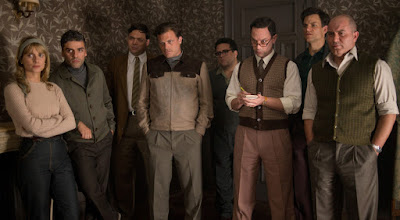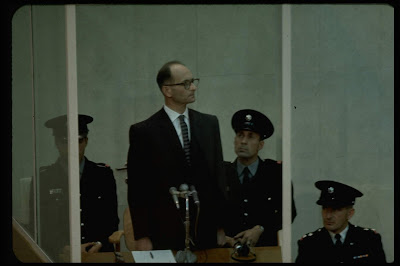"Remember, man, that thou art dust, and to dust thou shalt return"
Genesis 3:19
Oh, there have been howls in the wilderness over the film The Golden Compass, and not the kind you'd expect from anything like armored polar bears.
No, indeed. The Catholic Church (which's taken a few knocks lately) and the Catholic Legion of Decency have awakened like vampires and condemned this film, based of Philip Pullman's trilogy of novels (under the title "His Dark Materials" published between 1995 and 2000)--though the Legion is remarkably silent over the Church's own trespasses.
Then there are those fans of the books who are beating their breasts with their Anniversary Editions saying that it doesn't do "justice" to them.Well, checking my own personal Alethiometer, I can say they're both wrong, if not downright irrelevant in their arguments. The Catholics' stance won't do anything but help the movie.* If they really wanted to prove they meant business they could excommunicate Catholic Nicole Kidman, but I think that would generate so much sympathy that folks might even forgive her for Bewitched! And the "chapter-and-versers" will just have to live with the fact that "books is books" and "movies is movies", and both media have their story-telling strengths that are oftentimes incompatible with each other.**
Enough of the controversy, how's the movie? Immensely satisfying for a first chapter (and half-a-movie). There are unresolved issues galore, confused motivations, and the lurking feeling that things might have played out a bit faster than the time it takes to say "To Be Continued" three times fast. But the production design is killer, the performances are good (though Daniel Craig has little to do, or offer, as Lord Asriel), and the effects work is exemplary. The Golden Compass takes place in a world not too unlike our own, except that, instead of souls, people have "daemons," animal-like wraiths who shape-shift until maturity sets in for the host. 

That's the background dust...er, stuff.
Our heroine, Lyra (Dakota Blue Richards), is a headstrong urchin of an orphan living at Oxford as the ward of Lord Asriel, an explorer-adventurer of some note and seeker of the truth about this "dust" business, the mention of which is considered heresy by (and produce much paroxysms in) The Magisterium. Lord Asriel goes off adventuring and Lyra is entrusted with an Alethiometer, a Golden Compass, which will tell her the truth of a subject if its asked in precisely the right way--not unlike a Press Spokesman. She also comes under the slinky thumb of Mrs. Coulter (Nicole Kidman, in full "evil-squint" mode), who does "official business" for The Magisterium, whom, she explains, "tells people what to do...but in a nice way...to keep things working."
Lyra is always being told to behave, yet, she has, as her two mentors, two head-strong people who like to say "no one tells me what to do." So, soon Lyra is rebelling, and escapes from Mrs. Coulter (in a scene that, in all the discourse, is given dramatically short-shrift) and embarks on a series of adventures that entails the kidnapping of two of her friends, a hook-up with a band of the takens' parents, a countrified aeronaut (Sam Elliott, never more twinklingly courtly), and a displaced prince of a polar bear playing "Hamlet."
It's this section where the film really shines. The bears are marvels of CGI animation with wonderful actors like Ians McShane and McKellan (What? Him...again? Can they make a fantasy film without this guy?) breathing life through their vocal performances. One sight that made me laugh was during the Big Fight for "Polar Bear King," when Iorek Byrnison (McKellan's bear) has his armored head-piece knocked off and the camera (computer?) follows it to the edge of the ring, where the spectator-bears stare curiously dumb at it. The film is awash with pictorial touched like that, that fill in and make this world real whenever the story-telling turns miserly.
Performances are uniformly fine--though Craig under-performs. Perhaps he'll be given more to do later, although it's pretty apparent who of the characters you're supposed to be rooting for early on. Time will have to tell. But it's quite good for being half-a-movie. Certainly it makes you anticipate the sequels.
It has been reported in the news that the Vatican has been "consoled" by the film's less-than-golden opening receipts. But probably less than they were when "Deliver Us From Evil" or Spotlight underperformed.HBO is doing a marvelous 3 season series of Pullman's books, with lovely detail to the material.
* Showing off my talents as a prognosticator, the film did poorly at the box office and plans for other films in the series were canceled by NewLine. The entire series of films is being done—and done quite well—for HBO, which has so much money from "Game of Thrones," they can afford to offend the Catholic Church. By the way, with my margin or error, I have the makings to be your average pollster!
** Trouble is NewLine Cinema, which was perfectly alright with 3.5 hour versions of Tolkien, but did not want this one to be 3 hours long and so they took back the film from Chris Weitz and cut a great deal of material from it, rendering it a bit hedgy in the exposition and transition department.



















